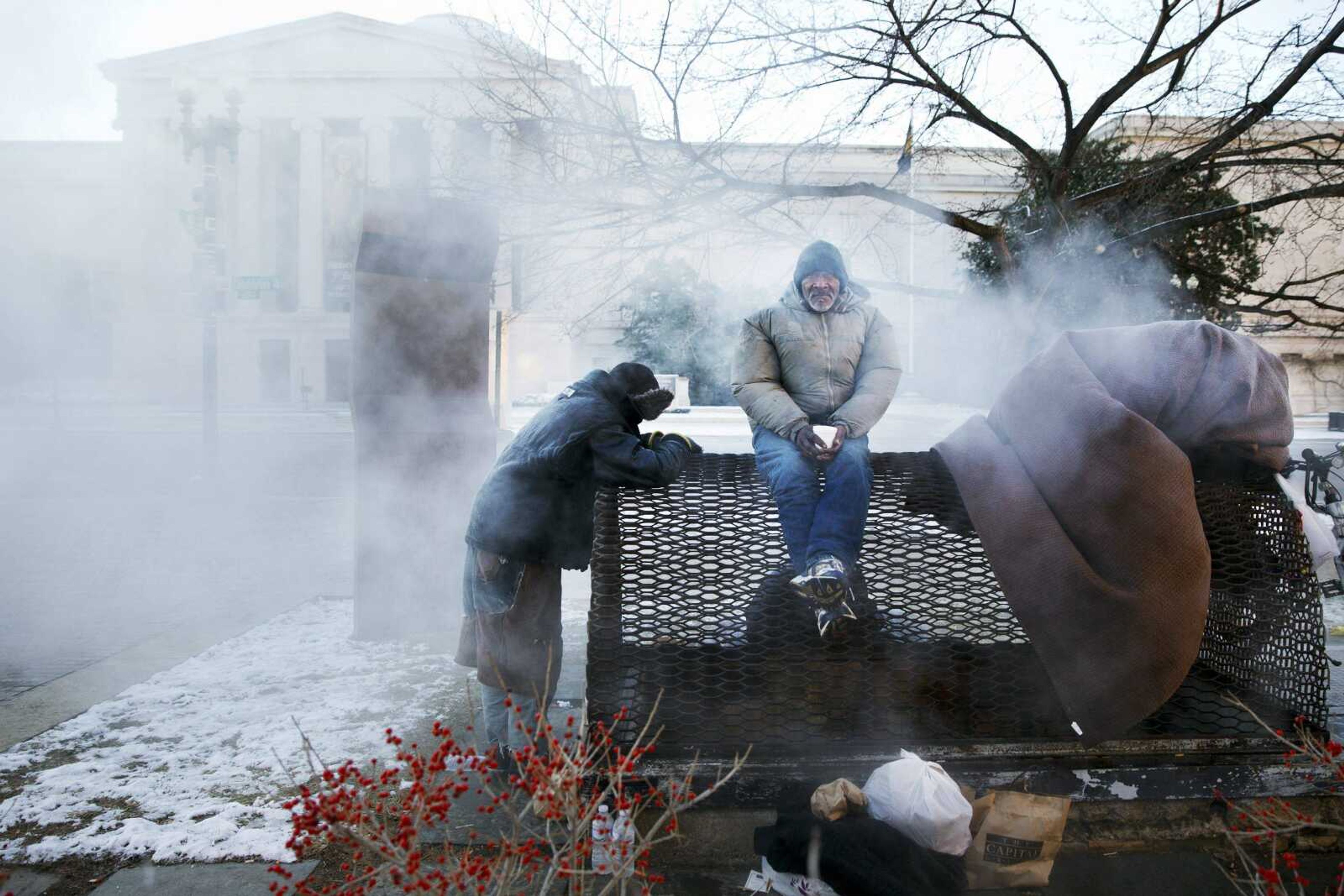Deep freeze may break records
The deep freeze expected soon in the Midwest, New England and even the South will be one to remember, with potential record-low temperatures heightening fears of frostbite and hypothermia. The frigid air will begin today and extend into early next week, funneled as far south as the Gulf Coast...
The deep freeze expected soon in the Midwest, New England and even the South will be one to remember, with potential record-low temperatures heightening fears of frostbite and hypothermia.
The frigid air will begin today and extend into early next week, funneled as far south as the Gulf Coast.
A winter storm warning was in effect from midnight to 6 p.m. today for Southeast Missouri and Southern Illinois, with the National Weather Service in Paducah, Ky., calling for a mix of rain and snow late Saturday night through daybreak, transitioning to snow across the area early this morning.
Meteorologists predicted total snowfall of 5 to 10 inches across the region, with higher amounts possible in localized areas, according to a National Weather Service bulletin.
A National Weather Service forecast for today showed a high of 30 degrees and a low of minus 2 in Cape Girardeau.
Monday was expected to be even colder, with a high of zero and a chance of snow flurries, according to the National Weather Service website.
It hasn't been this cold for decades -- 20 years in Washington, D.C., 18 years in Milwaukee, 15 in Missouri -- even in the Midwest, where bundling up is second nature. Weather Bell meteorologist Ryan Maue said, "If you're under 40 [years old], you've not seen this stuff before."
Blame it on a "polar vortex," as one meteorologist calls it, a counterclockwise-rotating pool of cold, dense air.
"It's just a large area of very cold air that comes down, forms over the North Pole or polar regions ... usually stays in Canada, but this time it's going to come all the way into the eastern United States," said National Weather Service meteorologist Phillip Schumacher in Sioux Falls, S.D.
The predictions are: 25 below zero in Fargo, N.D., minus 31 in International Falls, Minn., and 15 below in Indianapolis and Chicago. At those temperatures, exposed skin can get frostbitten in minutes and hypothermia can quickly set in as wind chills may reach 50, 60 or 70 below zero.
Even wind chills of 25 below zero can do serious damage, according to National Weather Service meteorologist Scott Truett in St. Louis.
"Those are dangerous levels of wind chill," he said of the expected wind chill in Missouri at daybreak Monday. "A person not properly dressed could die easily in those conditions."
Already, parts of New England dropped into the negatives early Saturday, with East Brighton, Vt., seeing 30 below zero just after midnight and Allagash, Maine, hitting minus 36. The cold will sweep through other parts of New England where residents are digging out from a snowstorm.
Snow will reduce the sun's heating effect, so nighttime lows will plummet because of the strong northwest winds, Maue said. Fresh powder was expected in parts of the central Midwest and South starting Saturday night -- up to a foot in eastern Missouri and southern Michigan, 6 to 8 inches in central Illinois, 8 or more inches in western Kentucky and up to 6 inches in parts of middle Tennessee.
The South also will dip into temperatures rarely seen. By Monday morning, western and central Kentucky could be below zero -- "definitely record-breaking," said weather service meteorologist Christine Wielgos in Paducah, Ky. In Atlanta, Tuesday's high was expected to be in the mid-20s.
Today's NFL playoff game in Green Bay could be among one of the coldest ever played -- a frigid minus 2 degrees when the Packers and San Francisco 49ers kickoff at Lambeau Field. Medical experts suggest fans wear at least three layers and drink warm fluids -- not alcohol.
Minnesota has called off school Monday for the entire state -- the first such closing in 17 years -- as well as the Wisconsin cities of Milwaukee and Madison.
Before the polar plunge, Earth was as close as it gets to the sun each year on Saturday. The planet orbits the sun in an oval and on average is 93 million miles away. But every January, Earth is at perihelion, and on Saturday, it was only 91.4 million miles from the sun. But that proximity doesn't affect the planet's temperatures.
Maue noted it's relatively uncommon to have such frigid air blanket so much of the U.S., maybe once a decade or every couple of decades. Yet Truett said there are no clear trends in weather patterns to indicate what kind of temperatures are in store for the rest of the winter.
So far, this winter is proving to be a cold one.
"Right now for the winter, we will have had two significant shots of major Arctic air and we're only through the first week of January," Maue said.
--
Associated Press reporters Seth Borenstein and Shelley Adler in Washington; Bill Draper in Kansas City, Mo.; and Rebecca Yonker in Louisville, Ky., contributed to this report. Contact Carson Walker at http://twitter.com/carsonjw
------
Contact Carson Walker at http://twitter.com/carsonjw
------
Online:
Maps: http://1.usa.gov/19FjxxS
Wind chill: http://1.usa.gov/19FjvpT
Records: http://1.usa.gov/19Fjy59
Connect with the Southeast Missourian Newsroom:
For corrections to this story or other insights for the editor, click here. To submit a letter to the editor, click here. To learn about the Southeast Missourian’s AI Policy, click here.









